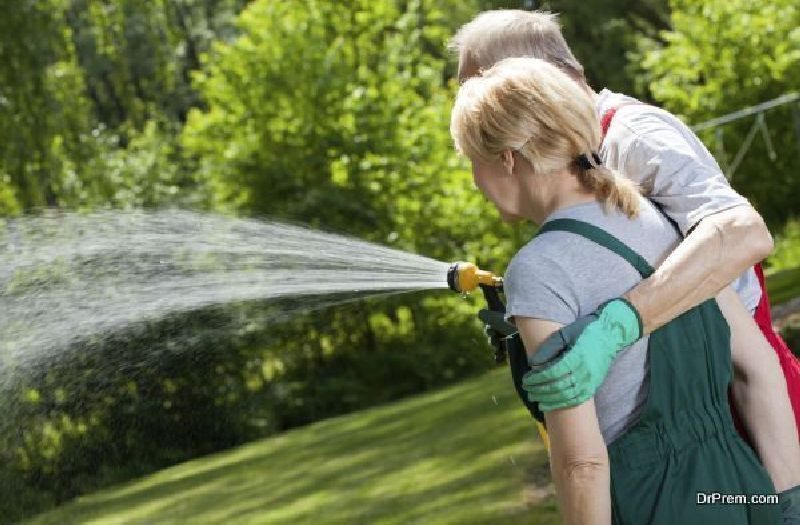As climate change becomes an increasingly prevalent problem all over the world, many households have started taking stock of their carbon footprints. When working to lessen their environmental impact, families often focus on energy consumption and water use – among many other things. While leading an eco-friendlier lifestyle is often associated with big changes inside of a home, your approach to outdoor tasks like lawn care can also have a direct impact on your carbon footprint. Luckily, maintaining a healthy lawn and doing your part for the environment don’t have to be mutually exclusive. Eco-conscious households on the hunt for lawn care advice would be wise to adopt the following measures.
Avoid Over-Mowing
 It’s easy to see why so many of us cut our grass as short as possible. After all, the shorter the lawn, the less frequently we’ll need to mow it. While there’s some truth in this reasoning, this approach to mowing generally comes at a cost. Since grass that’s cut too short has a hard time soaking in water and retaining essential nutrients, you’d do well to stick to the recommended length for your grass type. Excessively short grass requires a far greater degree of care than grass that’s kept at its ideal length – and the more care grass requires, the more resources it’s likely to consume.
It’s easy to see why so many of us cut our grass as short as possible. After all, the shorter the lawn, the less frequently we’ll need to mow it. While there’s some truth in this reasoning, this approach to mowing generally comes at a cost. Since grass that’s cut too short has a hard time soaking in water and retaining essential nutrients, you’d do well to stick to the recommended length for your grass type. Excessively short grass requires a far greater degree of care than grass that’s kept at its ideal length – and the more care grass requires, the more resources it’s likely to consume.
Up-cycle Your Grass Clippings
Instead of getting rid of grass clippings, why not put them to work? Unbeknownst to many households, grass clippings can act as natural fertilizer and provide lawns with valuable nourishment. These clippings contain water and assorted nutrients, enabling them to promote healthy growth. Just don’t let your grass get too long, as the clippings will take longer to decompose.
Alter Your Watering Practices
 Without even realizing it, many households overwater their lawns. Since most grass types require water to stay healthy and vibrant, people tend to believe that when it comes to watering, there’s no such thing as too much. However, giving your lawn more water than it needs not only wastes a valuable resource, it ultimately makes the grass more dependent on large amounts of water. One way to get around this is watering deeply but infrequently, which can help grass build strong roots. You may also want to consider installing an automated sprinkler system that administers just the right amount of water at just the right times. Alternatively, if you live in an area that receives a fair amount of rainfall, you may not need to water your grass at all. There’s no sense in wasting additional water if Mother Nature’s already got you covered.
Without even realizing it, many households overwater their lawns. Since most grass types require water to stay healthy and vibrant, people tend to believe that when it comes to watering, there’s no such thing as too much. However, giving your lawn more water than it needs not only wastes a valuable resource, it ultimately makes the grass more dependent on large amounts of water. One way to get around this is watering deeply but infrequently, which can help grass build strong roots. You may also want to consider installing an automated sprinkler system that administers just the right amount of water at just the right times. Alternatively, if you live in an area that receives a fair amount of rainfall, you may not need to water your grass at all. There’s no sense in wasting additional water if Mother Nature’s already got you covered.
Work with a Seasoned Lawn Care Company
Many households lack the time and expertise needed to fully throw themselves into lawn maintenance. If every member of your family has a busy schedule to attend to, finding the time to properly care for a lawn is liable to seem like an uphill battle. Rather than settle for an improperly-maintained lawn, why not outsource this job to seasoned pros? The right lawn care company will be able to provide your grass with ample TLC and give it all the tools it needs to thrive. Whether you’re looking for assistance with mowing, fertilizing, aerating, watering, feeding or any combination thereof, an experienced lawn care company will have you covered.
Before committing to work with a lawn care company, make sure they understand your unique needs. This means that if a certain level of eco-consciousness in the upkeep of your lawn is desired, take care to inform the company of this in advance. Furthermore, only do business with companies that are properly licensed and insured. Companies that lack licensing and/or insurance may charge lower rates, but there will be far less accountability in the event that something goes wrong.
The effects of climate change have become impossible to deny. Even many global warming deniers have come to recognize this issue as one of the greatest crises of our time. To help counteract mounting climate problems, a growing number of households have started taking active measures to reduce their environmental impact. When working to decrease your carbon footprint, avoid limiting your efforts to tasks performed inside your home. The measures discussed above will help you approach outdoor tasks with the same level of cautious conservation.
Article Submitted By Community Writer




